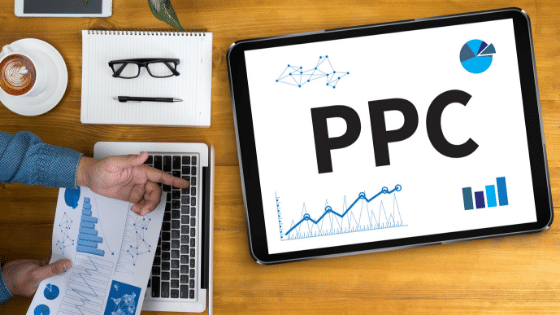What is Pay-Per-Click Advertising?
Pay-per-click advertisement, also known as PPC is a type of internet marketing that is charged by clicks. In other words, you don’t get charged unless your ad gets clicked on—it’s a method of buying visits to your site. Anytime your ad is clicked, and someone visits your site, you are charged a fee.
Google Ads
Google Ads, formerly known as Google AdWords, is the most commonly used pay-per-click advertising system. The pay-per-click model in Google Ads works by allowing users to bid on specific keywords for their ads, then they pay for each click on their ad.
When someone searches on Google, the search engine digs into a deep pool of ads. Google chooses the ads to display based on a combination of factors. Essentially the ads that appear will rank the highest. The ranking is determined by two factors—the PPC bid and the quality score. The PPC bid or CPC bid is the amount the advertiser is willing to spend. The quality score is a value of your click-through rate, relevance, and landing page quality.
Text Ads
PPC text ads are composed of written copy. Each platform has different formatting and character limits. Text ads are ranked when users search for keywords that are in your PPC campaign. These ads are usually formatted with a title, subtitle, and a small amount of text.
Display Ads
A PPC display ad is in the form of an image or motion graphic. Depending on the platform you’re using, there will likely be size and content requirements for this visual creative.
Keys to a Successful Pay-Per-Click Campaign
A PPC campaign is as successful as you make it. Creating a quality pay-per-click campaign can be done with keyword density, a high-quality landing page, and a good quality score. Ensure that your ads are ranking high with a few of these tactics.
Keyword Relevance
First off, keyword relevance is extremely important. When you’re creating content and ads, use relevant PPC keywords. It’s best to aim for a keyword density of 2-3%. Too much more may be marked by Google as keyword stuffing. There isn’t really an ideal percentage of keyword density, but too little will not get you a ranking and too much will get flagged. Just look for that sweet spot by placing keywords in natural places.
Landing Page Quality
Landing page quality is also important. Optimizing landing pages with relative content will give your ranking a solid boost. Add a clear call-to-action, ensure that your website is user-friendly, and consistently add new relevant content to your site. Keep your sentences short and simple. Use subheadings to break up the text. Creating readable and relatable content will make for a better landing page.
Quality Score
The quality score is Google’s way of scoring the quality and relevance of your PPC campaign. If you have a higher quality score, you’ll be able to get more ad click with lower costs. The lower your quality score, the higher your costs per click.
Managing a Pay-Per-Click Campaign
After setting up your campaign, you’ll have to continue to manage it to ensure regular revenue. Regular account activity is necessary for an account’s success. As you are analyzing the performance of your campaign, consider adjusting a few of the following things to optimize on your PPC campaign:
Review and Add PPC Keywords
Continuously review PPC keywords being used. Which keywords are expensive? Which ones are under-performing? Shut off those keywords and review research other, more lucrative keywords that are relevant to your ad.
Add Negative Keywords
Non-converting terms can be added as negative keywords—this will improve relevancy and decrease any potential wasted spend.
Refine Landing Pages
To avoid sending all traffic to the same page, refine landing pages. Modify the content and the call-to-action on landing pages to align with specific searches and relevant keywords. Make all of your landing pages relevant and fill them relatable and new content regularly.
Improve Click-Through Rate
Improve your quality score and your click rate by splitting your ad groups. Smaller and more relevant ad groups will mean more clicks.
Benefits of Using Pay-Per-Click
PPC Gets Fast Results
Pay-Per-Click provides quick results. As soon as you have a good campaign in place, you’ll start getting traffic to your site. Paid searches yield much faster results than organic searches. You can continuously increase your revenue as you work on your campaign and see results quickly.
Reach Your Target Audience
PPC advertising allows you to reach a specific demographic. You can tailor your campaign to target the group of people that you want to connect with. You can reach people in specific locations, with specific interests, and more.
Expand Your Reach
Expand your marketing reach and start building up your online reputation with PPC. PPC advertising is a great way to increase your traffic and expand your reach. The vast reach of internet search engines can greatly increase your revenue when utilized.
Only Pay for Clicks
With pay-per-click advertising, you are only paying for clicks. That means you are paying for traffic to your site. You will not be charged for impressions or views, only clicks. That means that you are only paying for traffic from your targeted audience.
You Have Control
PPC gives you control. You pay when your targeted audience clicks on your ad and visits your site. You have full control over your costs!
If you want to use pay-per-click advertising to better utilizing your digital marketing, contact the team at REVITY. We’re dedicated to taking your company to the next level—increasing your revenue with integrity.





